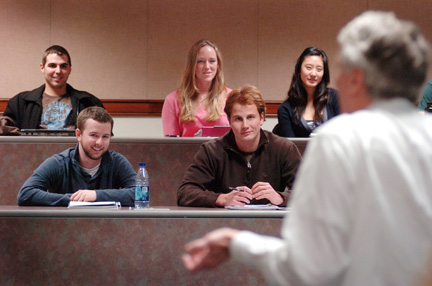A moving target.
Teaching the bailout in college.
From the March 13, 2009 Philadelphia Business Journal.
Professor John Pearce strolled around the classroom at Villanova University and posed a question to his 50 rapt students.
"If good business practices two years ago are still good practices today, why are we here?" Pearce bellowed, referring to the tenuous state of the global economy.
After a brief moment of silence, he continued.
"The game has not changed," he said. "But the way we keep score looks a little different now."

With a new presidential administration in office, a shift in political power, a newly implemented economic stimulus package, changing business regulations and tax structures, and overall global economic uncertainty, the business of doing business is evolving.
To address the needs of students preparing to enter the working world during this tumultuous time, Villanova's school of business created a multidisciplinary, real-time study of the economic collapse and the way businesses and governments are reacting.
The three-credit course, "Understanding the Global Marketplace in a Post-Bailout Economy," features 12 of the university's faculty members collaborating with area business leaders to discuss issues ranging from identifying who's at fault for the current crisis, to growing an economy in the 21st century.
"There's been so much going on in this post-economic-turmoil world and there are many implications to students," said James Danko, dean of the Villanova School of Business. "We're not going to pretend to know the answers even six months from now. But we're bringing forth the issues that aren't stale, that aren't 10 or 12 years old. These are very much new issues that are changing every day."
The idea for the course was hatched in October when John Kozup, associate professor of marketing and business law, and director of the Center for Marketing & Public Policy Research, met with a group of advisers. Kozup took the idea to the faculty who crafted the course within two weeks, in time for spring registration.
"The class filled up in less than one day," said Kozup, who is the primary instructor for the class. "We've got another 25 or 30 trying to get in."
Professors immediately volunteered to participate. Guests stepped up quickly.
Among the visitors expected are Herb Taylor, vice president of the Federal Reserve Bank of Philadelphia; Larry McWilliams, senior vice president of Campbell Soup Co., and Vern Farnsworth, a senior adviser for the National Foundation for Debt Management.
"There are going to be fundamental changes in finance, financial services, food regulations, media, everything," said Kozup. "We have a diverse group of folks coming in to talk about real-time training and the challenges facing businesses."
Historically, academia has waited for such unusual circumstances - like 9/11, the Enron and WorldCom scandals, and the savings-and-loan crisis of the '80s - to play out before courses are built around them, said John Fernandes, president and CEO of the Association to Advance Collegiate Schools of Business.
"When something disruptive happens, schools tend to take the learning experiences of the occurrence and weave it into the curriculum as it applies to existing courses," said Fernandes. "You don't see courses built as sort of a quick fix very often."
The mortgage crisis, financial collapse and the bailout are in steady discussion in area business programs but few of the region's universities have designed new courses around the subject.
The Wharton School at the University of Pennsylvania offered a half-credit course called "The Economic and Financial Crisis: Causes, Consequences, and Policy Options," which follows a similar, multi-disciplinary approach involving numerous faculty members. Lehigh University offered a one-credit, abbreviated course during the fall semester titled, "Managing the Financial Crisis."
"These types of classes will be a lot of fun for the students and probably, the students will be a lot wiser," Fernandes said. "They'll see some of the difficulties that governments have in restarting business. The downside is, who's to know what's right? We'll know in a couple of years."
Solutions aside, the class discussions create a stimulating atmosphere, students report.
"As a student, you're looking for answers right now," said Michael Cali, a Villanova senior finance and marketing major from Marlboro, N.J. "You read the papers and there are conflicting answers. Even the teachers are asking just as many questions as the students. It's an exciting time."
Sameer Khosla, a senior double majoring in finance and marketing and minoring in international business, said that during job interviews, potential employers constantly ask for opinions on the contemporary business landscape.
"Being exposed to speakers who share their own understanding and outlook on the future of the global marketplace will surely help me to define my own perspective," said Khosla, a Moorestown, N.J., native who interned at Goldman Sachs last summer.
The course, Kozup said, is intended to teach students to be entrepreneurial, to recognize trends and identify opportunities.
"The route to getting a job has changed from going north to New York to going south to DC," said Colleen Furman, a senior from Akron, Ohio. "The jobs are still there, just in a different capacity and location."
Furman said that the class has been completely different from the others she has taken - a different instructor every week, various guests, and a syllabus that changes as events unfold.
"As a senior in the business school," she added, "I was thrilled to have the opportunity to take a truly relevant class that evolves in congruence with the economy and on a daily basis."








